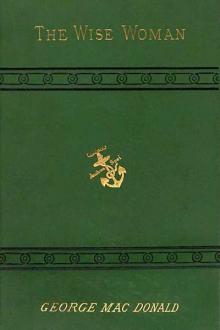The Wise Woman - George MacDonald (good books for high schoolers .txt) 📗

- Author: George MacDonald
- Performer: -
Book online «The Wise Woman - George MacDonald (good books for high schoolers .txt) 📗». Author George MacDonald
She jumped out of bed, and hurried on her clothes. There was no wise woman to be seen, and she hastened into the hall. There was the picture, with the marble palace, and the proclamation shining in letters of gold upon its gates of brass! She stood before it and gazed and gazed; and all the time it kept growing upon her in some strange way until at last she was fully persuaded that it was no picture, but a real city, square, and marble palace, seen through a framed opening in the wall. She ran up to the frame, stepped over it, felt the wind blow upon her cheek, heard the sound of a closing door behind her, and was free. Free was she?—with that creature inside her?
The same moment a terrible storm of thunder and lightning, wind and rain, came on. The uproar was appalling. Agnes threw herself upon the ground, hid her face in her hands, and there lay until it was over. As soon as she felt the sun shining on her, she rose. There was the city far away on the horizon! Without once turning to take a farewell look at the place she was leaving, she set off, as fast as her feet would carry her, in the direction of the city. So eager was she that again and again she fell, but only to get up and run on faster than before.
CHAPTER IX.
The shepherdess carried Rosamond home, gave her a warm bath in the tub in which she washed her linen, made her some bread-and-milk, and after she had eaten it, put her to bed in Agnes’s crib, where she slept all the rest of that day and all the following night.
When at last she opened her eyes, it was to see around her a far poorer cottage than the one she had left—very bare and uncomfortable indeed, she might well have thought; but she had come through such troubles of late, in the way of hunger and weariness and cold and fear, that she was not altogether in her ordinary mood of fault-finding, and so was able to lie enjoying the thought that at length she was safe, and going to be fed and kept warm. The idea of doing anything in return for shelter and food and clothes, did not, however, even cross her mind.
But the shepherdess was one of that plentiful number who can be wiser concerning other women’s children than concerning their own. Such will often give you very tolerable hints as to how you ought to manage your children, and will find fault neatly enough with the system you are trying to carry out; but all their wisdom goes off in talking, and there is none left for doing what they have themselves said. There is one road talk never finds, and that is the way into the talker’s own hands and feet. And such never seem to know themselves—not even when they are reading about themselves in print. Still, not being specially blinded in any direction but their own, they can sometimes even act with a little sense towards children who are not theirs. They are affected with a sort of blindness like that which renders some people incapable of seeing except sideways.
She came up to the bed, looked at the princess, and saw that she was better. But she did not like her much. There was no mark of a princess about her, and never had been since she began to run alone. True, hunger had brought down her fat cheeks, but it had not turned down her impudent nose, or driven the sullenness and greed from her mouth. Nothing but the wise woman could do that—and not even she, without the aid of the princess herself. So the shepherdess thought what a poor substitute she had got for her own lovely Agnes—who was in fact equally repulsive, only in a way to which she had got used; for the selfishness in her love had blinded her to the thin pinched nose and the mean self-satisfied mouth. It was well for the princess, though, sad as it is to say, that the shepherdess did not take to her, for then she would most likely have only done her harm instead of good.
“Now, my girl,” she said, “you must get up and do something. We can’t keep idle folk here.”
“I’m not a folk,” said Rosamond; “I’m a princess.”
“A pretty princess—with a nose like that! And all in rags too! If you tell such stories, I shall soon let you know what I think of you.”
Rosamond then understood that the mere calling herself a princess, without having anything to show for it, was of no use. She obeyed and rose, for she was hungry; but she had to sweep the floor ere she had anything to eat.
The shepherd came in to breakfast, and was kinder than his wife. He took her up in his arms and would have kissed her; but she took it as an insult from a man whose hands smelt of tar, and kicked and screamed with rage. The poor man, finding he had made a mistake, set her down at once. But to look at the two, one might well have judged it condescension rather than rudeness in such a man to kiss such a child. He was tall, and almost stately, with a thoughtful forehead, bright eyes, eagle nose, and gentle mouth; while the princess was such as I have described her.
Not content with being set down and let alone, she continued to storm and scold at the shepherd, crying she was a princess, and would like to know what right he had to touch her! But he only looked down upon her from the height of his tall person with a benignant smile, regarding her as a spoiled little ape whose mother had flattered her by calling her a princess.
“Turn her out of doors, the ungrateful hussy!” cried his wife. “With your bread and your milk inside her ugly body, this is what she gives you for it! Troth, I’m paid for carrying home such an ill-bred tramp in my arms! My own poor angel Agnes! As if that illtempered toad were one hair like her!”
These words drove the princess beside herself; for those who are most given to abuse can least endure it. With fists and feet and teeth, as was her wont, she rushed at the shepherdess, whose hand was already raised to deal her a sound box on the ear, when a better appointed minister of vengeance suddenly showed himself. Bounding in at the cottage door came one of the sheep-dogs, who was called Prince, and whom I shall not refer to with a which, because he was a very superior animal indeed, even for a sheep-dog, which is the most intelligent of dogs: he flew at the princess, knocked her down, and commenced shaking her so violently as to tear her miserable clothes to pieces. Used, however, to mouthing little lambs, he took care not to hurt her much, though for her good he left her a blue nip or two, by way of letting her imagine what biting might be. His master, knowing he would not injure her, thought it better not to call him off, and in half a minute he left her of his own accord, and, casting a glance of indignant rebuke behind him as he went, walked slowly to the hearth, where he laid himself down with his tail towards her. She rose, terrified almost to death, and would have crept again into Agnes’s crib for refuge; but the shepherdess cried-“Come, come, princess! I’ll have no skulking to bed in the good daylight. Go and clean your master’s Sunday boots there.”
“I will not!” screamed the princess, and ran from the house.
“Prince!” cried the shepherdess, and up jumped the dog, and looked in her face, wagging his bushy tail.
“Fetch her back,” she said, pointing to the door.
With two or three bounds Prince caught the princess, again threw her down, and taking her by her clothes dragged her back into the cottage, and dropped her at his mistress’ feet, where she lay like a bundle of rags.
“Get up,” said the shepherdess.
Rosamond got up, as pale as death.
“Go and clean the boots.”
“I don’t know how.”
“Go and try. There are the brushes, and yonder is the blacking pot.”
Instructing her how to black boots, it came into the thought of the shepherdess what a fine thing it would be if she could teach this miserable little wretch, so forsaken and ill-bred, to be a good, well-behaved, respectable child. She was hardly the woman to do it, but everything well meant is a help, and she had the wisdom to beg her husband to place Prince under her orders for a while, and not take him to the hill as usual, that he might help her in getting the princess into order.
When her husband was gone, and his boots, with the aid of her own finishing touches, at last quite respectably brushed, the shepherdess told the princess that she might go and play for a while, only she must not go out of sight of the cottage door.
The princess went right gladly, with the firm intention, however, of getting out of sight by slow degrees, and then at once taking to her heels. But no sooner was she over the threshold than the shepherdess said to the dog, “Watch her;” and out shot Prince.
The moment she saw him, Rosamond threw herself on her face, trembling from head to foot. But the dog had no quarrel with her, and of the violence against which he always felt bound to protest in dog fashion, there was no sign in the prostrate shape before him; so he poked his nose under her, turned her over, and began licking her face and hands. When she saw that he meant to be friendly, her love for animals, which had had no indulgence for a long time now, came wide awake, and in a little while they were romping and rushing about, the best friends in the world.
Having thus seen one enemy, as she thought, changed to a friend, she began to resume her former plan, and crept cunningly farther and farther. At length she came to a little hollow, and instantly rolled down into it. Finding then that she was out of sight of the cottage, she ran off at full speed.
But she had not gone more than a dozen paces when she heard a growling rush behind her, and the next instant was on the ground, with the dog standing over her, showing his teeth, and flaming at her with his eyes. She threw her arms round his neck, and immediately he licked her face, and let her get up. But the moment she would have moved a step farther from the cottage, there he was in front of her, growling and showing his teeth. She saw it was of no use, and went back with him.
Thus was the princess provided with a dog for a private tutor just the right sort for her.
Presently the shepherdess appeared at the door and called her. She would have disregarded the summons, but Prince did his best to let her know that, until she could obey herself, she must obey him. So she went into the cottage, and there the shepherdess ordered her to peel the potatoes for dinner. She sulked





Comments (0)